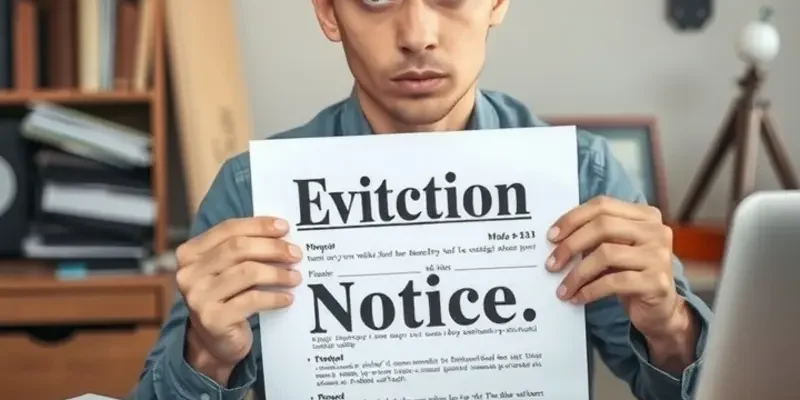Moving into a new rental can feel exciting yet overwhelming, especially for young professionals, first-time renters, students, couples, and families. The shift from living at home or in a dorm to finding your own space comes with a myriad of responsibilities, among which understanding your rights as a tenant is paramount. Knowing what to expect during the rental process can alleviate fears, especially when facing potential eviction. Eviction processes differ across states, but core rights exist that every renter should be aware of. Being informed empowers you to stand up for yourself while navigating lease agreements, understanding your responsibilities, and avoiding unnecessary pitfalls. Whether you are negotiating your first lease or dealing with an unexpected eviction notice, it’s crucial to know your rights. In this guide, we’ll break down the basics of renter’s rights during eviction, ensuring you’re well-prepared and confident in your journey as a tenant.
Understanding Eviction Notices: What You Need to Know

An eviction notice is the first formal step in the eviction process. As a tenant, understanding its purpose and implications is crucial in protecting your rights and preparing an appropriate response. Eviction notices come in various forms, each serving a specific function. The most common types are ‘Pay or Quit,’ ‘Cure or Quit,’ and ‘Unconditional Quit’ notices.
A ‘Pay or Quit’ notice is issued when a tenant has missed rent payments. This notice gives tenants a specified period, usually between three and five days, to pay the overdue rent or vacate the property. If the tenant pays within this timeframe, the lease continues as usual.
A ‘Cure or Quit’ notice is used when a tenant violates a lease term, such as having a pet in a no-pet property. The tenant is given a chance to correct the violation within a set period. Failure to do so might lead to further eviction proceedings.
An ‘Unconditional Quit’ notice demands that the tenant vacate the premises with no chance to remedy the issue. This notice is typically reserved for severe lease violations. Legal reasons may include endangering the health or safety of other residents or repeated lease violations.
When receiving an eviction notice, you must act quickly. The timeframes for action vary depending on local laws and the type of notice. It’s important to verify the notice’s validity and ensure it meets all legal requirements. For instance, the notice should clearly state the reason for eviction, the timeframe to respond, and the potential consequences.
Landlords have obligations they must uphold when issuing eviction notices. These include serving the notice properly and following local tenancy laws. Failure to adhere to these requirements can invalidate an eviction notice.
For young renters, it’s vital to recognize your rights when facing an eviction notice. You are entitled to clear communication from your landlord regarding the terms and reasons for the notice. If you believe an eviction is unfair, you may have the right to contest it in court. Having a solid understanding of your lease agreement and keeping records of communication with your landlord can support your case.
Knowing the eviction’s rationale is crucial. Non-payment of rent cases will differ significantly from other offenses, like lease violations. Courts typically grant more leniency towards tenants who’ve failed to pay rent if they can catch up on payments. However, repeated lease violations may present a more complex defense.
Dealing with the financial implications of eviction requires preparation. Financial planning can help young renters manage their finances better, minimizing the risk of eviction due to non-payment. For tips on improving your financial situation, you might consider exploring resources like renter credit improvement tips.
Understanding eviction notices and recognizing your rights empowers you to take informed actions and safeguards your interests as a tenant. While the process can be intimidating, knowledge is your most powerful tool in navigating any potential legal proceedings.
Your Rights During the Eviction Process: Standing Up for Yourself

Facing an eviction can be a daunting experience, especially for young renters who may feel powerless. Understanding what to expect during the eviction process is crucial. From the moment you receive an eviction notice, you have the right to challenge it. Familiarizing yourself with the process can help you stand up for your rights effectively.
Firstly, let’s explore the typical court procedures and timelines involved. After receiving an eviction notice, you generally have a set period to respond. This timeframe varies by jurisdiction but is typically between 7 to 14 days. During this time, it’s crucial to gather relevant documents, such as your lease agreement, rent receipts, and any correspondence with your landlord. These documents could serve as vital evidence if you contest the eviction.
If the case proceeds to court, you’ll have the right to present your side. Keep in mind that a fair hearing isn’t just a formality; it’s a core component of your rights as a tenant. You may contest the eviction based on several valid defenses. Common defenses include proving that the landlord did not follow proper eviction procedures or that the eviction is retaliatory or discriminatory.
Gathering evidence is essential. Documentation showing that you’ve paid rent or that the landlord didn’t adhere to maintenance requirements can be significant. For young couples and families, this is especially important, as presenting a unified and well-documented case can greatly impact the outcome.
The importance of legal representation cannot be overstated. Hiring an attorney who specializes in tenant law can greatly increase your chances of success. If hiring a lawyer is financially unfeasible, seek assistance from legal aid organizations or tenant advocacy groups. Many such organizations provide free or low-cost services to those in need.
Numerous resources exist to assist renters during this process. Local tenant advocacy groups often offer workshops and materials on tenants’ rights. Additionally, some websites provide valuable information on how to handle eviction and even offer guidance on financial planning for renters. In challenging times, exploring these resources can be beneficial.
Research and connect with local tenant rights organizations—these groups often provide free counseling and advice. They can help you understand your rights and options, as well as connect you with pro bono legal support if necessary.
Another aspect to consider is the community impact of eviction. Young renters with families may worry about the ripple effects on stability and finances. Addressing these concerns by exploring financial planning for renters can provide additional peace of mind.
Remember, knowledge is empowerment. By understanding your rights and preparing effectively, you can navigate the eviction process with confidence and poise. Don’t hesitate to reach out for help and use every tool at your disposal to assert your rights.
Final words
Eviction can be a daunting experience, but it does not have to be faced alone or in ignorance. Understanding your rights as a tenant empowers you to take action and make informed decisions. Whether you’re a young professional, a first-time renter, a student, or a family navigating the rental landscape, your lease is not just a document—it’s a protective framework. Know the difference between legal eviction grounds and unlawful actions, and remember that there are resources available to help you during challenging times. By arming yourself with knowledge, you transform from a passive renter to an informed advocate for your own living conditions. Keep advocating for yourself and stay informed, and you can navigate even the toughest rental challenges with confidence.









